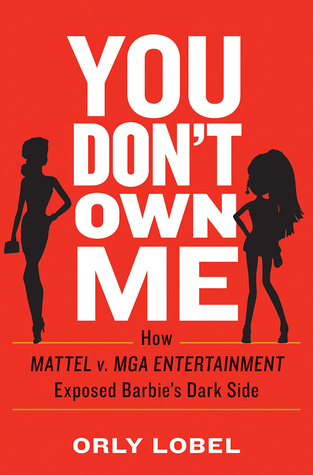 |
| Photograph by Sharon Wright |
 You Don’t Own Me has nothing and everything to do with intellectual
property law. Lobel’s book does not intend to teach or re-tell the story of
copyright or trade mark through Barbie’s experience. So-called ‘black-letter’ IP
commentaries make a fleeting appearance in Lobel’s narration (pp. 152-157;
162-163), but they do not pretend to be the star of the show.
You Don’t Own Me has nothing and everything to do with intellectual
property law. Lobel’s book does not intend to teach or re-tell the story of
copyright or trade mark through Barbie’s experience. So-called ‘black-letter’ IP
commentaries make a fleeting appearance in Lobel’s narration (pp. 152-157;
162-163), but they do not pretend to be the star of the show.
There is no disappointment to be
had over this, because the book captures a much more interesting story: the
hidden story of all intellectual property disputes. Such story comprises the various
periods of employment and collaboration between the parties, the contracts, the
negotiations, the going to court, the witness preparation, and the relationship
with judges and jurors. These are only a few of the many elements which can
have an impact on a court’s decision regarding the ownership of a creative
work. This experience will be familiar to all US-based practitioners, but
readers outside of the US or in academic circles will encounter it with
interest, as it is rarely discussed in the literature.
It is interesting to note in
Lobel’s narration that much of the dispute rested on pinpointing the exact
‘eureka’ moment that sparked the whole ‘Bratz project’ led by the anti-Barbie
doll creator Carter Bryant (p. 25, 146, 145-149). Was it during Bryant’s
employment at Mattel, at ‘week-ends and nights’, or afterwards? It appears,
from Lobel’s recounting of the dispute, that not much was made to challenge the
fallacy of the ‘eureka moment’ concept, which is now roundly debunked, having
been criticized decades by psychologists
and ‘creative research’ specialists as presenting an over-simplified depiction of creativity that is disconnected from reality (for
more on the western model of creativity see here).
One last reason why this book has
everything to do with intellectual property is because it touches upon a
subject that is little discussed yet an essential part of the ‘copyright
industries’: merchandising. Recently, this Kat was told by IP scholar Dr Jose
Bellido, specialist on the question of IP and merchandising, that we should
the read early IP/merchandising cases as ‘hidden’ landmark IP cases. Should
this be true, we should all expect the IP/merchandising section of the
literature grow, with Lobel's book as one of the pack-leaders.
Book reviewed: You Don’t Own Me: How Mattel v. MGA
Entertainment Exposed Barbie’s Dark Side. By Orly Lobel. Norton, 304pp,
£20.00. ISBN 9780393254075. Published 2 January 2018.
| Barbie and the Bratz |
Book review: You Don’t Own Me: How Mattel v MGA Entertainment Exposed Barbie’s Dark Side
 Reviewed by Mathilde Pavis
on
Monday, April 30, 2018
Rating:
Reviewed by Mathilde Pavis
on
Monday, April 30, 2018
Rating:
 Reviewed by Mathilde Pavis
on
Monday, April 30, 2018
Rating:
Reviewed by Mathilde Pavis
on
Monday, April 30, 2018
Rating:





![[GuestPost] G1/24: Tuning in! A take on the state of proceedings before oral proceedings](https://blogger.googleusercontent.com/img/b/R29vZ2xl/AVvXsEjZhEivE5bp7QOwZsyZXAXbVNYSmLjUthkB2Q7fm1_dpB97u5lIQeyWT9ZadUTAH3Z-hXn13VpW4vBDRPx9emCnoDV6tbUTkyvfmqPv1nNInL8XMdrAtSZ2hcRQr2LjxKovC9wTk_XyZxQ0CtX1MUrO_Muz3OJ4ld8AftymsdUmKD7xNksYMwk6/s150/Picture%201.png)

![[Guest post] ‘Ghiblification’ and the Moral Wrongs of U.S. Copyright Law](https://blogger.googleusercontent.com/img/b/R29vZ2xl/AVvXsEhxl1BQBAW3Y-asjb1xXB9eA4DYy77fky6WgR-prC-_6DeBbDqOgCUDWyiz0Q3B23MWWAXnkbS2H2js7OUwA0JQXAHmsyVFgGIHeJz7zJ791vTzOD-4SJqWFIuywFXQyd3ahybbdZd4e8IEVfcNqctvyR8lumv_Gix6Tsw5cSvbHpTI1nwvztDuAQ/s150/IMG_2179.HEIC)



![[Guest book review] The Handbook of Fashion Law (with a discount code)](https://blogger.googleusercontent.com/img/b/R29vZ2xl/AVvXsEgB4h2AdqJKwq9O3Ft4Mb7C39tv_NeFpkzrOfvhIsuwAkM_ops2Hgj7fdwzq_TQsjQDvQrQa-yyC9Q9pNiugseXRlUaMdsr_cmYUbh9lH8HDECMCbsTuNboVgpafyEhkgDkVS6ruHkuz8Sx0QVGI_1S8R9kbsHdNIYrRjqhyphenhyphen010_txjJUYvlZOtWA/s150/Fashion%20Law%20Book%20Bicture.jpg)




No comments:
All comments must be moderated by a member of the IPKat team before they appear on the blog. Comments will not be allowed if the contravene the IPKat policy that readers' comments should not be obscene or defamatory; they should not consist of ad hominem attacks on members of the blog team or other comment-posters and they should make a constructive contribution to the discussion of the post on which they purport to comment.
It is also the IPKat policy that comments should not be made completely anonymously, and users should use a consistent name or pseudonym (which should not itself be defamatory or obscene, or that of another real person), either in the "identity" field, or at the beginning of the comment. Current practice is to, however, allow a limited number of comments that contravene this policy, provided that the comment has a high degree of relevance and the comment chain does not become too difficult to follow.
Learn more here: http://ipkitten.blogspot.com/p/want-to-complain.html